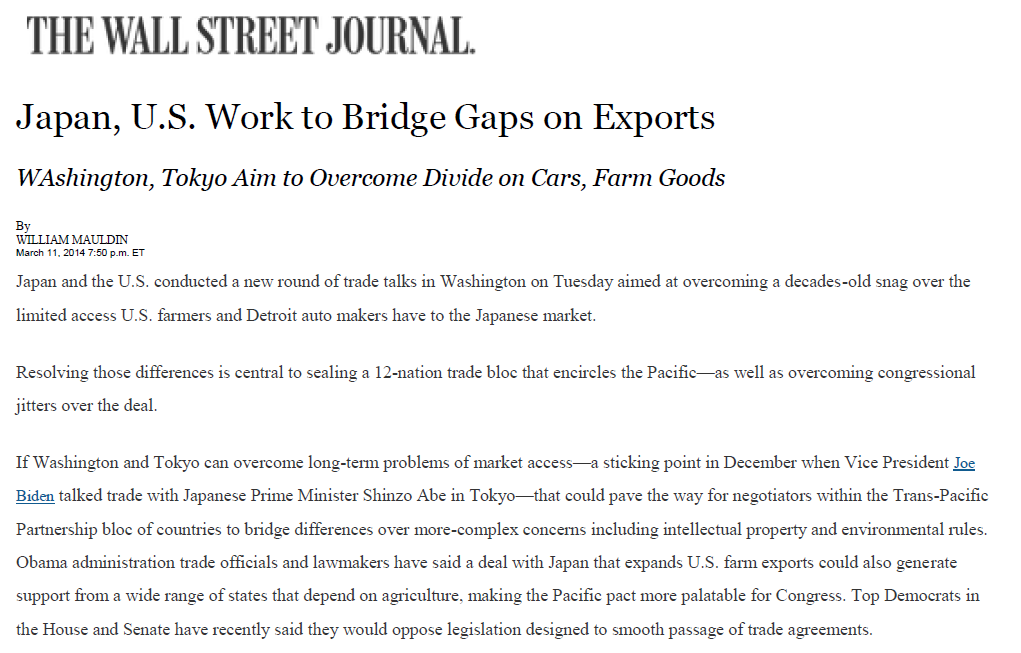Washington, Tokyo Aim to Overcome Divide on Cars, Farm Goods
By William Mauldin
March 11, 2014
Japan and the U.S. conducted a new round of trade talks in Washington on Tuesday aimed at overcoming a decades-old snag over the limited access U.S. farmers and Detroit auto makers have to the Japanese market. Resolving those differences is central to sealing a 12-nation trade bloc that encircles the Pacific—as well as overcoming congressional jitters over the deal. If Washington and Tokyo can overcome long-term problems of market access—a sticking point in December when Vice President Joe Biden talked trade with Japanese Prime Minister Shinzo Abe in Tokyo—that could pave the way for negotiators within the Trans-Pacific Partnership bloc of countries to bridge differences over more-complex concerns including intellectual property and environmental rules. Obama administration trade officials and lawmakers have said a deal with Japan that expands U.S. farm exports could also generate support from a wide range of states that depend on agriculture, making the Pacific pact more palatable for Congress. Top Democrats in the House and Senate have recently said they would oppose legislation designed to smooth passage of trade agreements. “I don’t think there can be a successful TPP unless there are very basic breakthroughs with Japan in terms of market access,” said Rep. Sander Levin, a Michigan Democrat who is skeptical of administration trade policy. Tokyo made some concessions before it joined the broader TPP talks last year, allowing more U.S. beef shipments and greater access to its insurance market, a major goal for Wall Street. But the two sides have shown little progress since then. “This is not a negotiation for the timid,” said Mickey Kantor, former U.S. trade representative under President Bill Clinton. Mr. Kantor worked for years to ease Japanese rules on U.S. cars, agriculture and glass in Japan in the 1990s. There is also a geopolitical element: Japan has seen rising tensions with China, not a part of current TPP talks, while the U.S. wants to rebalance its strategic and economic focus to Asia. Linking Pacific countries could simultaneously isolate China and encourage Beijing to open its markets, U.S. officials say. They also warn that U.S. businesses could end up at a relative disadvantage if the European Union, currently in trade talks with Tokyo, strikes a deal first. In February, Mr. Biden underscored the strategic arguments for the TPP at a retreat of Democratic lawmakers, telling the group how he pushed hard with Mr. Abe to win more market access for U.S. car makers, according to attendees. The Japanese minister overseeing the TPP, Akira Amari, said Tuesday he expects “significant progress” coming out of this week’s talks, seen as an opportunity to pursue a breakthrough before President Barack Obama’s visit to Japan next month. A spokeswoman for the Japanese Embassy in Washington declined to comment on Tuesday’s talks, and a spokesman for the U.S. Trade Representative didn’t respond to requests for comment. U.S. auto makers opposed Tokyo’s entry into the TPP talks, and lawmakers from car-producing states, including Mr. Levin of Michigan, are wary of the negotiations as well. Detroit worries that Japanese-made cars could be more competitive under the TPP if the U.S. removes a 2.5% tariff on the imports over time, as proposed in the talks. The tariff break would save Japanese exporters about $1 billion a year, especially on Japanese-branded luxury, hybrid and electric vehicles not built in the U.S. Japan sent $37.8 billion in assembled cars to the U.S. in 2013, compared with just $960 million going the other direction—about the same amount U.S. sends to Kuwait, according to the U.S. Census Bureau. Germany, another top car exporter, spent six times as much as Japan on U.S. cars. The American Automotive Policy Council, which represents General Motors Co., Ford Motor Co. and Chrysler Group LLC, says a complex set of regulatory barriers in Japan keeps Detroit cars out. The AAPC is also asking the Obama administration to negotiate rules to prevent foreign governments from manipulating foreign currencies as a part of the TPP, something they say Japan has done in the past to benefit its car makers. That position has gained widespread support in Congress, but U.S. officials say they are dealing with currency intervention in other international forums rather than through the TPP. Backers of the TPP say Detroit wants to sour the talks. Japanese car makers attribute Detroit’s tiny market share in Japan to a lack of commitment to the market and poor decisions about which cars to sell there. “We don’t think there are any trade barriers in Japan in terms of autos,” said Ron Bookbinder, U.S. director for the Japan Automobile Manufacturers Association. While U.S.-based auto makers retain significant influence, the agricultural issues separating Washington and Japan may be more crucial to completing a deal, since farming touches most congressional districts.
Original Source: The Wall Street Journal
Click to view PDF


